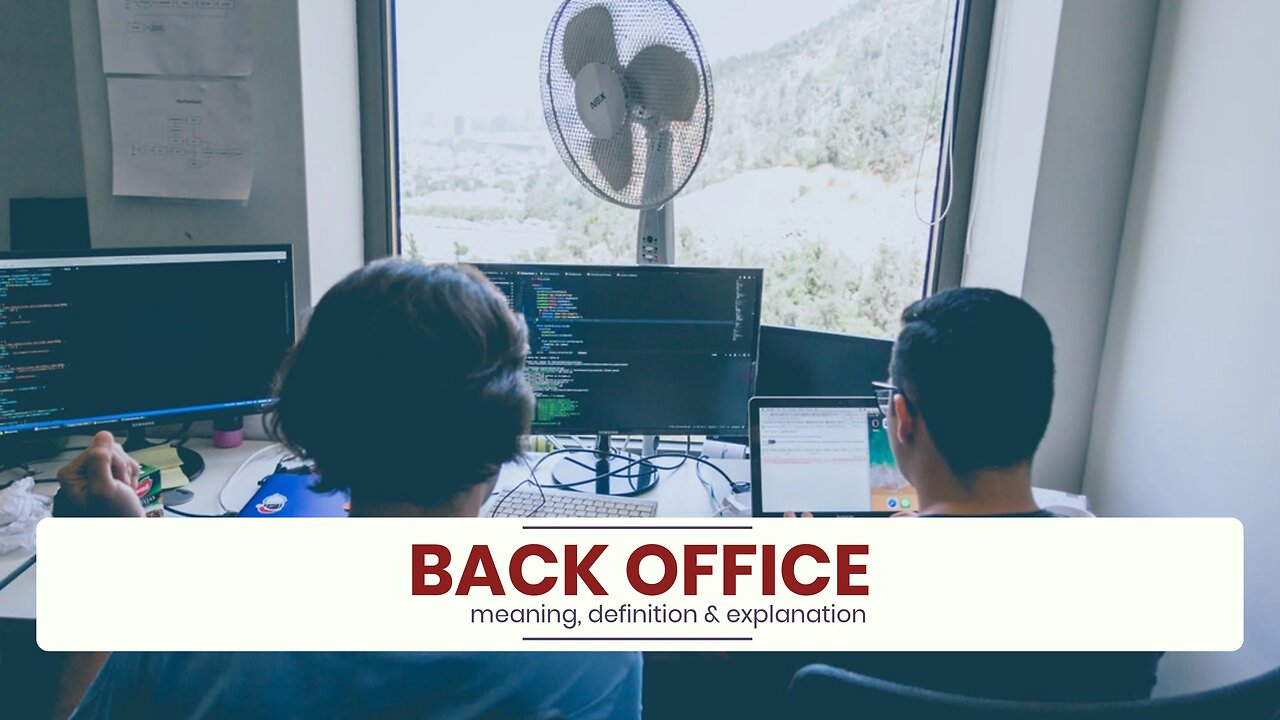Premium Only Content

What is BACK OFFICE?
✪✪✪✪✪
http://www.theaudiopedia.com
✪✪✪✪✪
What does BACK OFFICE mean? BACK OFFICE meaning - BACK OFFICE definition - BACK OFFICE explanation. What is the meaning of BACK OFFICE? What is the definition of BACK OFFICE? What does BACK OFFICE stand for? What is BACK OFFICE meaning? What is BACK OFFICE definition?
A back office in most corporations is where tasks dedicated to running the company itself take place. The term back office comes from the building layout of early companies where the front office would contain the sales and other customer-facing staff and the back office would be those manufacturing or developing the products or those involved in administration without being seen by customers. Although the operations of a back office are seldom prominent, they are a major contributor to a business. Broadly speaking, back office includes roles that affect the left side (costs) of business' trading statement.
Back offices may be located somewhere other than company headquarters. Many are in areas and countries with cheaper rent and lower labor costs. Some office parks provide back offices for tenants whose front offices are in more expensive neighborhoods. Back office functions can be outsourced to consultants and contractors, including ones in other countries.
Examples of back-office tasks include IT departments that keep the phones and computers running (operations architecture), accounting, and human resources. These tasks are often supported by back-office systems: secure e-commerce software that processes company information (e.g., databases). A back-office system will keep a record of the company’s sales and purchase transactions, and update the inventory as needed. Invoices, receipts, and reports can also be produced by the back-office system.
In banking, the back office includes a heavyweight IT processing system that handles position keeping, clearance, and settlement, but does not include the Compliance Department, which would be an external office.
In investment firms, the back office includes the administrative functions that support the trading of securities, including record keeping, trade confirmation, trade settlement, and regulatory compliance.
In sales, the back office typically plays a key role internally, providing support to the sales force for administrative duties such as legal, finance, marketing, order management, operations support, as well as customer facing roles typically positioned to include functions that support customer order fulfillment and duties involved with readying customer-support call centers.
-
 1:41
1:41
The Audiopedia
7 months agoWhat is PUBLIC DEBT?
53 -
 2:47:25
2:47:25
Right Side Broadcasting Network
8 hours agoLIVE REPLAY: President Donald J. Trump Holds First Press Briefing Since Inauguration - 1/21/25
201K171 -
 LIVE
LIVE
Man in America
6 hours ago🔴 LIVE: Trump UNLEASHED! Dismantling the Deep State and Restoring America
1,346 watching -
 LIVE
LIVE
I_Came_With_Fire_Podcast
8 hours ago🔥SPECIAL RELEASE🔥 Inflation Reduction Act: American Seniors Get SLAMMED!!
135 watching -
 DVR
DVR
vivafrei
7 hours agoD.C. Gulag Jan. 6 Prisoners Release Watch!
135K73 -
 1:49:14
1:49:14
Redacted News
6 hours agoTrump is Back! Congress Uncovers New Biden Crimes One Day After He Leaves D.C. | Redacted
138K209 -
 2:09:53
2:09:53
Benny Johnson
6 hours ago🚨President Trump LIVE Right Now Making MASSIVE Announcement At White House News Conference
247K305 -
 2:04:10
2:04:10
Revenge of the Cis
7 hours agoEpisode 1433: Retribution
99.2K13 -
 1:42:50
1:42:50
The Criminal Connection Podcast
11 hours ago $0.77 earnedEddie Hearn talks JOSHUA vs FURY, Working With Frank Warren & The Truth About Turki Alalshikh!
44.1K2 -
 1:00:25
1:00:25
In The Litter Box w/ Jewels & Catturd
1 day agoGolden Age | In the Litter Box w/ Jewels & Catturd – Ep. 724 – 1/21/2025
135K61